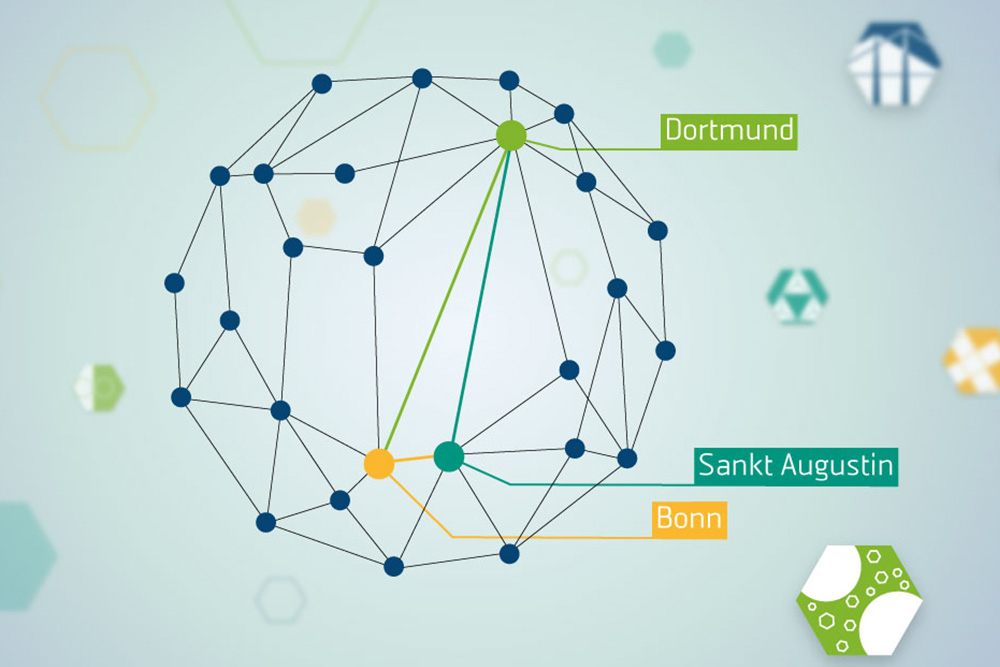Bringing Machine Learning into the Surface -BMBF Competence Center Launches in NRW
Establishing cutting-edge research, promoting young talent, strengthening technology transfer in companies – these are the elementary building blocks for bringing the development of artificial intelligence in Germany to a globally leading level. With this goal in mind, the “Kompetenzzentrum Maschinelles Lernen Rhein-Ruhr” (ML2R) (Competence Center Machine Learning Rhine-Ruhr), initiated and funded by the Federal Ministry of Education and Research (BMBF), was launched in Dortmund and Bonn/Sankt Augustin. Together, the Technical University of Dortmund, the University of Bonn and the Fraunhofer Institutes for Intelligent Analysis and Information Systems IAIS in Sankt Augustin and for Material Flow and Logistics IML in Dortmund will decisively advance cutting-edge research in the field of Machine Learning. After all, Machine Learning is the key to intelligent products and processes, new business models and an edge over international competition. Speakers of the center are Prof. Dr. Katharina Morik (TU Dortmund) and Prof. Dr. Stefan Wrobel (University of Bonn/Fraunhofer IAIS).
Machine Learning (ML) is the basic technology for applications that rely on Artificial Intelligence – they interpret texts and images, make medical diagnoses or optimize manufacturing processes. In combination with increasingly cheaper and more powerful sensors and processors, ML techniques are becoming decisive competitive factors in many areas. Research, politics and companies want to exploit this potential, but are faced with central challenges: They need comprehensible, trustworthy technologies that can be flexibly integrated into existing processes. Germany currently lacks top international researchers and well-trained specialists who develop the relevant technologies. Often there is also a lack of well-prepared data to train learning systems optimally and to use them profitably.
“We want to meet these challenges by promoting excellent research locations in the field of Machine Learning and intensively networking them with industry,” says Anja Karliczek, Federal Minister of Education and Research. “I am therefore delighted that we have been able to establish the Rhine-Ruhr Machine Learning Competence Center, one of a total of four central hubs in Germany”. In addition to ML2R in Dortmund and Bonn/Sankt Augustin, three further BMBF competence centers are planned in Berlin, Baden-Württemberg and Bavaria.
Attractive environment for outstanding research
“The Rhine-Ruhr location combines a pioneering role in the development of artificial intelligence with nationwide leading institutions for industry-related, applied research,” says Prof. Dr. Katharina Morik, spokeswoman for the competence center. “We thus offer both renowned top researchers and young scientists an attractive environment in which to expand the theoretical foundations of ML and develop responsible applications on this basis. ML2R concentrates its research work on three main areas:
- Human-oriented Machine Learning focuses on the human being and designs Machine Learning processes in such a way that decisions made with the aid of artificial intelligence are comprehensible, comprehensible and can be validated.
- Machine learning with limited resources makes it possible to reliably perform calculations using Machine Learning even on small devices such as smartphones or directly in sensors. For a long time, computing resources could be ignored. In the meantime, the models of Machine Learning are thought together with different computer architectures up to quantum computing.
- Machine learning with complex knowledge integrates logical knowledge from different sources into learning systems to ensure reliable results even with small or uncertain data sets.
Within these focal points, aspects such as the modular design of the technologies, real-time capability and error limits play just as important a role as the security of the data.
New cooperation models strengthen transfer and promote networking
The research results are to be used on short ways for practice-oriented applications and serve as basis for the development of new data-based services. Application examples from industry 4.0, logistics and process automation will provide orientation. Above all, ML2R should offer small and medium-sized enterprises access to strategies, knowledge and data so that they can successfully use ML technologies and survive in international competition. “Here we offer companies concrete cooperation opportunities such as agile cooperation with our scientists in the ‘Enterprise Innovation Campus'”, emphasises Prof. Dr. Stefan Wrobel, speaker of the competence center. “In addition, we will set up an open source platform with curated data and models so that companies have direct access to data and technologies and can start immediately.
In order to counteract the shortage of skilled workers, ML2R will be strongly committed to supporting young scientists and promoting further training opportunities for skilled workers in companies. The competence center is initially planned to run for four years and aims for long-term sustainability in order to promote Machine Learning and support Germany’s industry in international competition.
The first public event of the ML2R Competence Center with international experts from ML research and an exhibition of innovative use cases will take place on 23 January 2019 in Dortmund.
Press contact:
Katrin Berkler
Head of Press and Public Relations
Competence Center Machine Learning Rhine-Ruhr
Phone: +49 2241 14-2252


